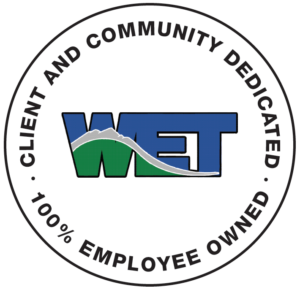LITIGATION SUPPORT
WET offers litigation support services related to all aspects of groundwater production, water rights, and contaminant hydrogeology
WET has extensive experience in litigation support projects ranging from regulatory issues to water rights issues to remediation of complex contaminated sites. This experience is both on the plaintiff’s and defendants’ side of the issue, depending on our evaluation of the issue.
Expert Witness
Our staff started providing expert witness services in the early 1990s with a case involving contamination at a County Landfill and a UST leak at a gas station. Since then, we have participated in lawsuits pertaining to leaky USTs, industrial facilities, chemical storage, pipelines, oil & gas production, hydraulic fracturing, water rights, mining, and Concentrated Animal Feeding Operations (CAFOs). We have been involved in every aspect of legal actions, usually starting with discovery, independent data collection, and regulation research: and ending with a settlement or verdict.
WET’s expert witness duties include educating the attorney on the technical issues, aiding in selecting an expert witness team, supervising the technical team, identifying pertinent questions for the opposing experts, and most importantly, open identification of technical strengths and weaknesses in the case. WET’s litigation support team consists of senior level scientists with over 30 years of practical experience. WET works on both the plaintiff’s and defense side of litigation.
With respect to litigation teams, WET knows how to interact with attorneys and experts of other disciplines to aid in the understanding of complex contaminant migration issues, contaminant fate and transport characteristics, remedial measures, and finally restoration or remediation costs and damages.
WET personnel have acted as lead expert, where they have assembled or directed the team of experts needed to characterize the technical aspects of a case, and effectively communicate these issues to a judge or jury.
We have participated in hundreds of depositions, have been on the stand over 30 times, and involved in arbitration, hearings, or settlement negotiations on multiple occasions. The various settlements we have been involved with resulted in changing of regulations, remediation of private properties, and individual settlements in excess of $250 million.
Our approach to litigation support issues is simple:
- Collect independent data
- Thoroughly research the issue
- Understand the site characteristics
- Understand the contaminant characteristics
- Apply scientifically supported, common sense solutions
- Explain these solutions in a simple straightforward manner
If all parties understand the issues and the potential solutions, a responsible, equitable solution is more likely.
Settlement/Negotiation
WET’s Senior members have been involved in all types of settlement negotiations: from large, multiyear Superfund restoration agreements to complex consent decrees involving remediation and compliance, to water rights disputes, to state and federal court toxic chemical settlements. Our goal is always to remain professional and offer practical and appropriate technical solutions to the issue at hand.
We have the experience and expertise to provide practical solutions to very complex problems and the knowledge to explain the benefits and pitfalls of any settlement proposal. WET also can engineer unique solutions when negotiations are at a standstill.
Because of our practical and professional approach, we have worked on the solutions after settlement on many of our cases. The continued work has been for a restoration of trust, for our client, or, on several instances, for the opposing party. We have even been complimented by a Federal Judge and awarded expert fees immediately following the verdict. The fact that we have worked on the restoration or corrective measure on behalf or in conjunction with the opposition on multiple occasions is a testament to our professionalism and independence during the litigation, settlement, or trial.
Field Assessment
Collection of independent field data is both essential and highly scrutinized by opposing parties with litigation projects. WET has trained field personnel, equipment, and expertise to investigate any hydrogeologic environment or contaminant issue to efficiently characterize site conditions.
Prior to field activities, WET prepares a Sampling and Analysis Plan (SAP) along with a Quality Assurance Project Plan (QAPP) to ensure all data collected during the field investigation is defensible and has the proper quality assurance/quality control needed to satisfy both the Courts and State/Federal regulators.
During field activities, we have an experienced professional on-site to allow field work to pivot when unexpected circumstances arise. At almost every site, geologic conditions, contaminant concentrations, or remedial effectiveness are not consistent with what has been previously reported, and the presence of senior personnel with the ability to analyze the information in the field and make decisions to change the direction of the investigation are invaluable.
WET has investigated many contaminated sites ranging from USTs to chemical spills, to oil and gas production facilities, to fracking operations, and large Concentrated Animal Feeding Operations (CAFOs). WET has been involved with cases all over the United States including Alaska and Hawaii.
Remediation/Restoration
On multiple sites, WET has completed the remedial testing or pilot studies and designed, installed, and operated the remedial systems to remove the contamination issues at the site. In several cases, WET worked for the Restoration Trust formed because of the lawsuit, or with the responsible party to implement remediation. In one situation, we were hired by the responsible party to work with the EPA and complete approved designs for the remediation and long-term monitoring at the site.
WET has the technical staff and field personnel to design and implement creative remedial measures to achieve the goals of the consent decree, the regulatory agency, and the litigants.




POWER GENERATION PLANTS—UTAH & WYOMING
ELECTRIC POWER GENERATION FACILITIES—UTAH & WYOMING
COW PALACE DAIRY CAFO POND UPGRADE—YAKIMA, WASHINGTON